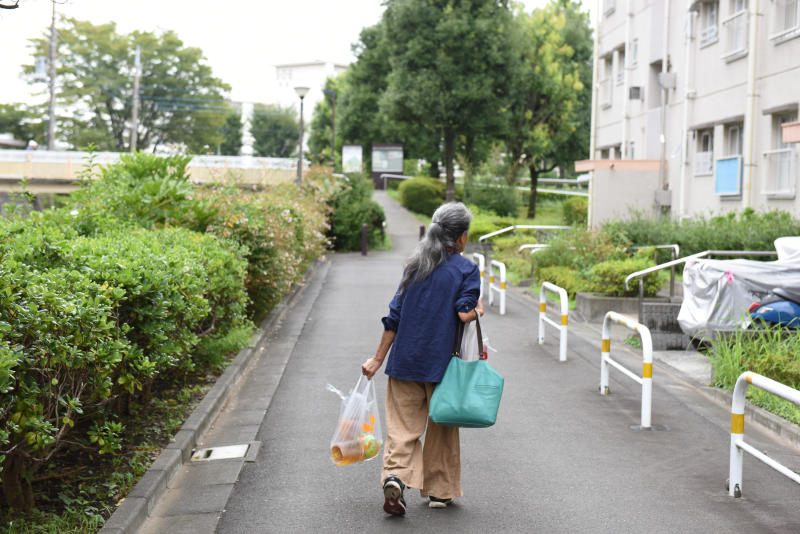Elderly women to bear the brunt of Japan's spending cuts
Sign up now: Get insights on Asia's fast-moving developments

Burdened by a public debt that amounts to 236 per cent of GDP, Japan's government is trimming spending on its ever-expanding elderly population. Women comprise 88 per cent of the nation's centenarians, a group that expanded to 68,000 in 2017 from 8,500 in 1997.
PHOTO: BLOOMBERG
Follow topic:
TOKYO (BLOOMBERG) - As Japanese society ages and the government cuts social welfare spending, older women are bracing for the impact.
"The only people who can enjoy living until 100 are those who have enough money and family," said Madam Setsuko Betsui, a 78-year-old woman living in Saitama, who gets by on 120,000 yen (S$1,482) a month in benefits. "I'd rather die in two years."
Burdened by a public debt that amounts to 236 per cent of gross domestic product, Japan's government is trimming spending on its ever-expanding elderly population.
The Ministry of Finance is lobbying to push the age when pension benefits start to 68, up from 65. Until 2000, the age was 60. Elderly care and medical care contributions already have been cut.
At the same time, an increasingly large portion of the population is elderly and living longer. Those 65 and older now comprise 27 per cent of society, up from 9 per cent in 1980 - making Japan's population the world's oldest.
"The current social welfare system doesn't assume people living until 100 years old," said chief researcher Yukiko Miyaki at The Dai-ichi Life Research Institute.
Elderly women, in particular, are under financial strain because they are less likely to have jobs to supplement their benefits. While 55 per cent of men in their late 60s currently work, only 35 per cent of women in that age group have jobs, according to the Cabinet Office.
It gets tougher to find work as ageing progresses. Women comprise 88 per cent of the nation's centenarians, a group that expanded to 68,000 in 2017 from 8,500 in 1997.
In the past, the government counted on other sources of support for ageing women. Wives benefited from their husbands' retirement bonuses and life insurance plans, and often they lived with their children after their husbands died.
These days, one-time payouts from retirement do not cover the needs of lengthening lifespans, and family units are shrinking.
The relative poverty rate for elderly people, at 19.4 per cent, exceeds the OECD average of 12.6 per cent. Among these people, 52 per cent of single women are living in relative poverty, compared with 38 per cent of single men.
"When the rapid-growth period was over, and the Japan's traditional life-long employment system ended, the government failed to gain consensus from taxpayers to shift the burden of this safety network from families to society," said Mr Takanori Fujita, an author of a popular book, Elders Descending Into Poverty.
Even now, Japan's social safety net largely revolves around the family unit, with housewives depending on their husbands after marriage, and then on their grown children. This system worked well 30 years ago, when half of families with someone 65 or older lived in a three-generation household.
Yet in three decades, the number of elderly people living alone has doubled. About 70 per cent of these people today are women.
Madam Hideyo Kitakami once had a middle-class life as a Tokyo housewife, with her husband's job in the television industry supporting the household. Now, at 60 and divorced, she lives on less than US$600 (S$820) a month.
She has been searching for a part-time job doing translation work for two months and has been rejected by more than 100 companies, saying she previously did not have trouble getting work.
"I'm sure I will be a poor, old woman," Madam Kitakami said. "If this suffering is going to continue, I don't need to live to 100."
Some say today's challenges are a legacy of a post-war system in which men were expected to toil away for long hours as so-called corporate warriors while housewives were expected to stay home and not worry about making money.
The government gave tax deductions to male workers if their wives earned less than about one million yen and offered exemptions from social insurance premiums for wives. Many companies gave employees a spousal allowance as well.
The government has envisioned a "100-year life" in the future in which citizens work well past retirement age to compensate for shrinking benefits. For some, this reality is already upon them, only without the jobs or enough benefits to make ends meet.

